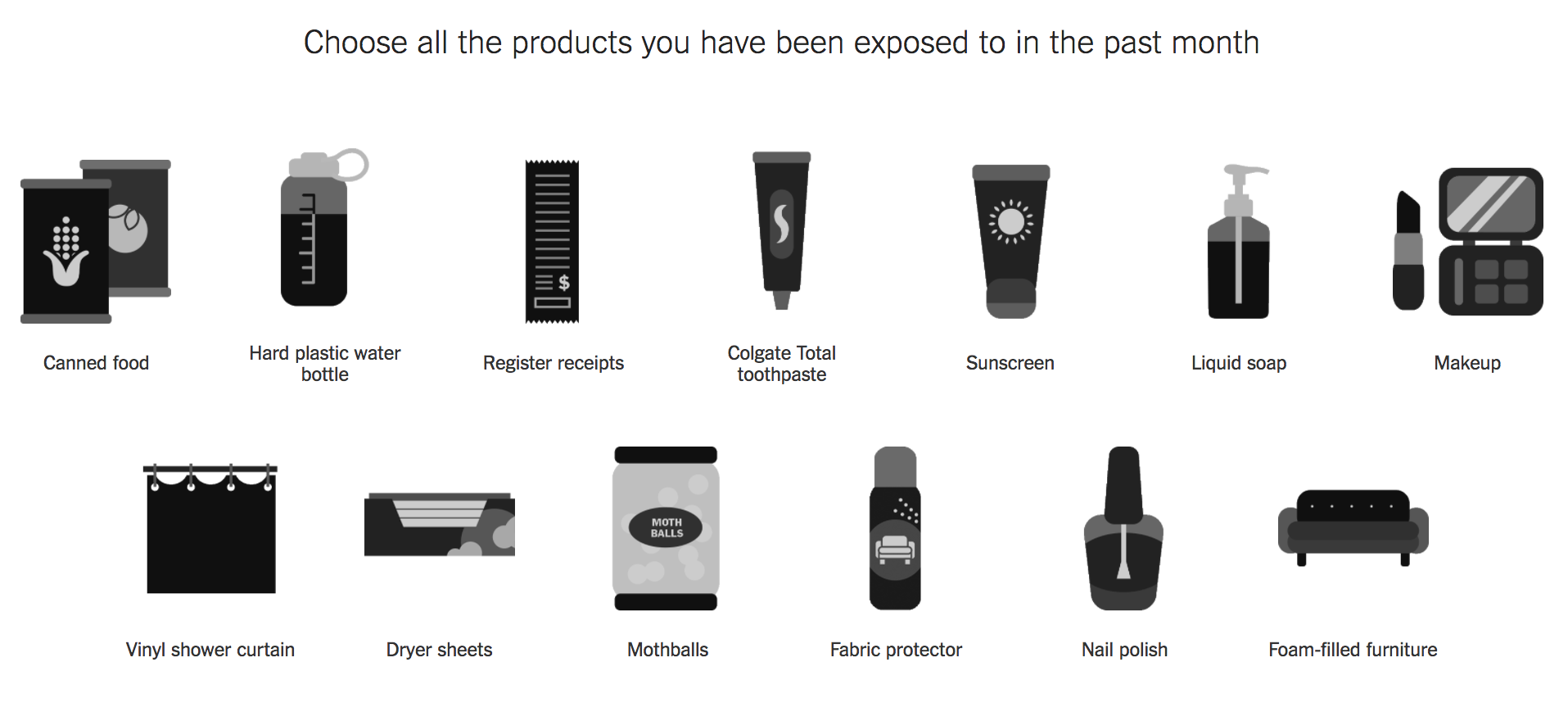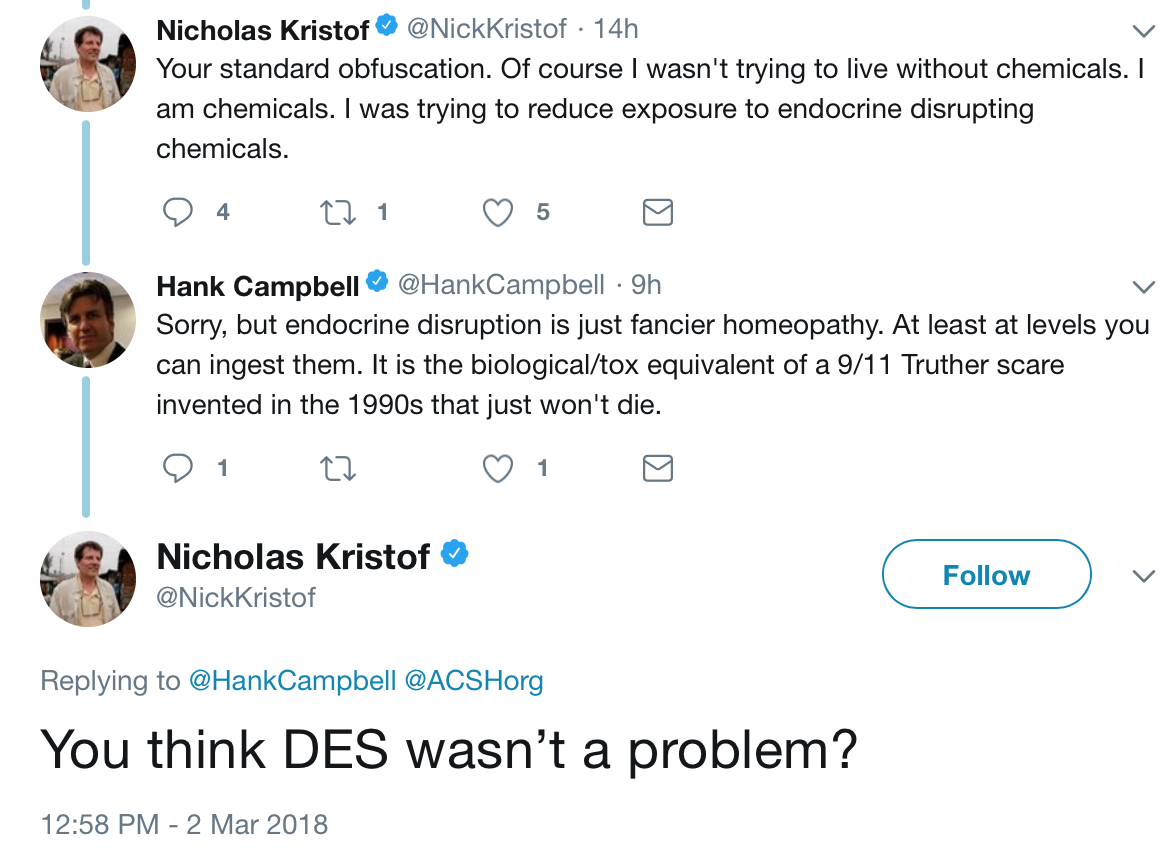It's often helpful for journalists who do not have specialized knowledge of complex scientific topics to write about them anyway, because if they can understand them and figure out how to communicate them, they can perform a tremendous public service. However, if journalists don't take the time to understand complex topics and get the very basics wrong, they do the public a massive disservice and end up looking like buffoons.
Which brings us to veteran New York Times columnist Nicholas Kristof, who studied law and fancies himself an expert in chemistry and toxicology. Chemists and toxicologists disagree.
His latest diatribe -- which was easily and thoroughly debunked by my colleagues Dr. Chuck Dinerstein and Ana Dolaskie -- begins with the single most shameless act of fearmongering I have ever seen from a major media outlet. He shows a bunch of common household products, all of which are perfectly safe, and asks, "What poisons are in your body?"

Look at all these lethal things: toothpaste, soap, shower curtains. It's amazing we all aren't dead yet. Mr. Kristof's "research" -- if you can even call it that -- relied heavily on well-known anti-science activists, such as the Environmental Working Group.
When we criticized his scientific ignorance, Mr. Kristof doubled down, as the scientifically ignorant always do:

It's interesting that his immediate defense is to lie about his writings. He isn't only afraid of endocrine disruptors; he's afraid he'll get cancer from popcorn, and he's worried that some enigmatic chemicals somewhere out there are causing diabetes, obesity, and autism. This level of paranoia is what we would expect from a chemtrail conspiracy theorist, not a public intellectual.
Mr. Kristof's reference to DES is typical chemophobic scaremongering. He points out a chemical that really is bad (DES), which in his mind justifies his demonization of every other chemical of which he is afraid. That's the chemistry equivalent of saying that all Muslims are suspicious because 9/11 happened.
Mr. Kristof has demonstrated time and again that he is entirely ignorant of the basic principles of chemistry and toxicology. And given that he has been widely criticized from all sorts of science writers, he's also completely impervious to being educated by actual experts.
So a Fool Returneth to His Folly
Consider what Deborah Blum, a chemistry writer, wrote about him:
Whenever Nicholas Kristof writes a piece about the evil, awful world of chemicals out there, I feel a twitchy need to kick something. Or someone. Possibly right there in The New York Times newsroom.
In perhaps the biggest indication that Mr. Kristof is fundamentally anti-science, he ignores evidence that he dislikes. That's utterly taboo for scientists, but par-for-the-course for NYT op-ed columnists. Writing in Forbes, Trevor Butterworth says:
[Kristof] applies no statistical or experimental criticism to these studies: they always “really” find what they claim to have found; and he seems unaware of the many non-industry funded studies or regulatory agency assessments that contradict them. There is no mention, for instance, of the 15-page point-by-point rebuttal written by the Food and Drug Administration to the Natural Resources Defense Council’s petition to ban BPA, a rebuttal which relies, primarily, on non-industry funded research. [Emphasis added]
Chemjobber, a blog that promotes jobs in chemistry, had this to say of Mr. Kristof:
I am a little at wit's end to understand how to help intelligent people like Mr. Kristof see past their clear fear of chemicals, the distrust they have of chemical companies and their seeming dismissal of regulatory agencies. It seems to me that he is all too credulous to the claims of organizations like the Silent Spring Institute that are incentivized to generate as much fear and doubt around chemicals as possible. [Emphasis added]
The New York Times Has Only One Editorial Standard
The real problem is that the New York Times has only one editorial standard: To publish whatever sells more copies to their Upper West Side clientele. That means throwing biotechnology and chemistry under the bus while embracing organic food, acupuncture, and other forms of witchcraft.
At one point, Mr. Kristof makes an attempt at humor:
Whenever you see flaws in my columns, that's just my neurotoxins at work.
No, the numerous flaws in your columns, Mr. Kristof, aren't because of neurotoxins in common household items. The flaws are because you would easily flunk an 8th grade science test.




